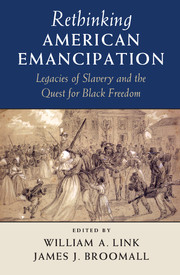Book contents
- Frontmatter
- Contents
- List of figures
- Notes on the Editors and Contributors
- Acknowledgments
- Introduction
- I CLAIMING EMANCIPATION
- II CONTESTING EMANCIPATION
- III REMEMBERING EMANCIPATION
- 7 African Americans and the Long Emancipation in New South Atlanta
- 8 Washington, Toussaint, and Bolivar, “The Glorious Advocates of Liberty”: Black Internationalism and Reimagining Emancipation
- 9 Remembering the Abolitionists and the Meanings of Freedom
- Epilogue: Emancipation and the Nation
- Index
Epilogue: Emancipation and the Nation
from III - REMEMBERING EMANCIPATION
Published online by Cambridge University Press: 05 November 2015
- Frontmatter
- Contents
- List of figures
- Notes on the Editors and Contributors
- Acknowledgments
- Introduction
- I CLAIMING EMANCIPATION
- II CONTESTING EMANCIPATION
- III REMEMBERING EMANCIPATION
- 7 African Americans and the Long Emancipation in New South Atlanta
- 8 Washington, Toussaint, and Bolivar, “The Glorious Advocates of Liberty”: Black Internationalism and Reimagining Emancipation
- 9 Remembering the Abolitionists and the Meanings of Freedom
- Epilogue: Emancipation and the Nation
- Index
Summary
Historians once treated African Americans as passive recipients of freedom, which came definitively, although piecemeal, through federal policies, starting with the Emancipation Proclamation and leading inevitably to the Thirteenth, Fourteenth, and Fifteenth Amendments. Those assumptions still linger in the historiography, despite our best efforts to eliminate them. Historians, for instance, still refer to the collapse of slavery or the extension of rights, phrasing that obscures not just the efforts of African Americans to claim freedom, but also the conflicts involved in securing it and making it meaningful. Still, such references give us pause now, precisely because they lag so far behind current conceptual paradigms, which characterize emancipation as a process and emphasize the importance of African Americans in that dynamic. The essays in Rethinking Emancipation: Legacies of Slavery and the Quest for Black Freedom build on those insights, treating the Emancipation Proclamation as one among many points in a much longer journey about what America would be without slavery.
That journey was a long one, because slavery's influence was so pervasive. The essays in Rethinking Emancipation show how pervasive it was, tracing the implications beyond African Americans, the South, and race relations in that region to people, places, and issues that, on the surface, might appear only loosely connected to slavery, if at all. On this broad canvas, the essays also challenge the meaning so often given to emancipation in the historiography. In these essays, emancipation is less about specific acts – such as the Emancipation Proclamation or the Thirteenth Amendment, or even the efforts of individual African Americans to flee slavery – and more a way of exploring the challenges and conflicts of remaking American life without slavery. Such an approach emphasizes emancipation's multiple meanings, which ranged from narrow conceptions that entailed nothing more than the elimination of slavery to expansive notions of racial equality. It also breaks the concept of emancipation apart, making it possible to see it as a process that unfolded at many levels: in individual lives as well as in the nation's social, economic, political, and legal structures. Some of the essays explore emancipation in terms of structural changes with wide-reaching effects.
- Type
- Chapter
- Information
- Rethinking American EmancipationLegacies of Slavery and the Quest for Black Freedom, pp. 252 - 270Publisher: Cambridge University PressPrint publication year: 2015



